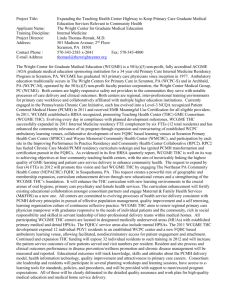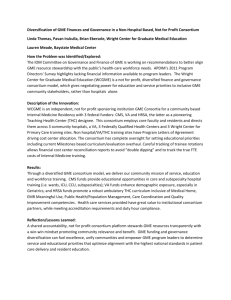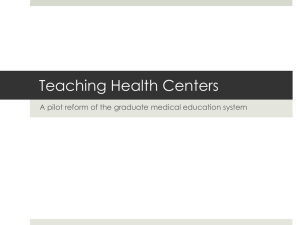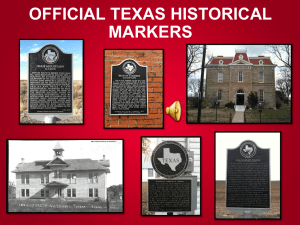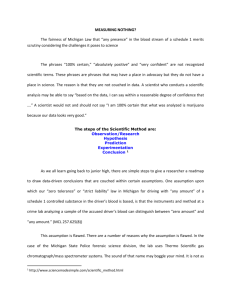Year 2 - The Wright Center
advertisement
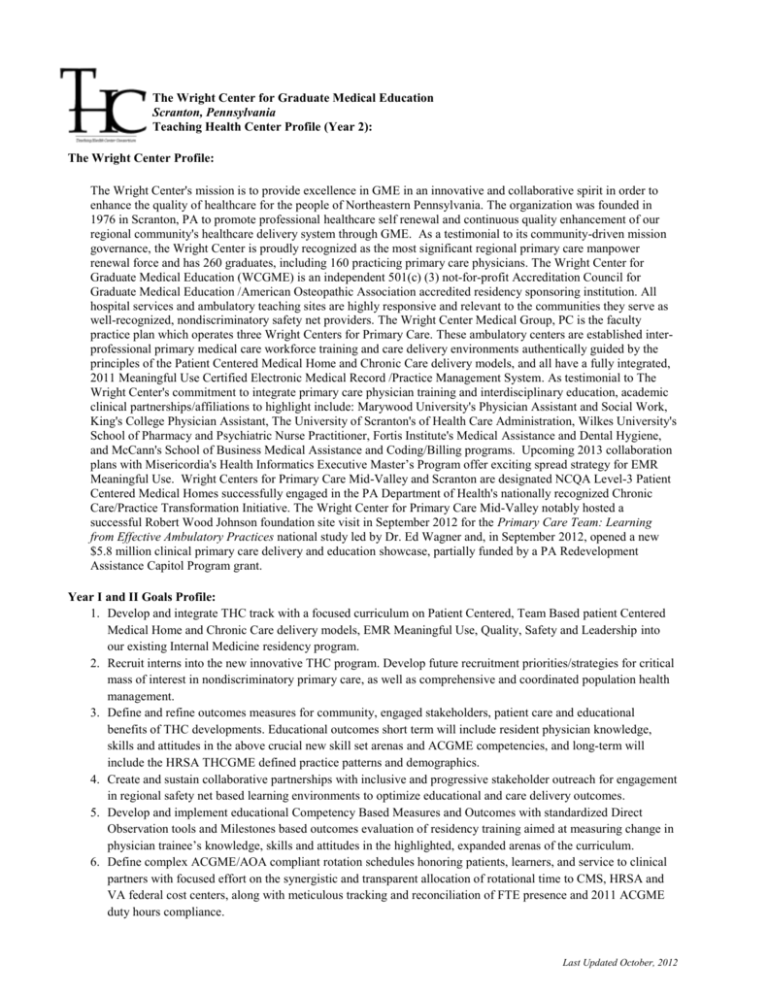
The Wright Center for Graduate Medical Education Scranton, Pennsylvania Teaching Health Center Profile (Year 2): The Wright Center Profile: The Wright Center's mission is to provide excellence in GME in an innovative and collaborative spirit in order to enhance the quality of healthcare for the people of Northeastern Pennsylvania. The organization was founded in 1976 in Scranton, PA to promote professional healthcare self renewal and continuous quality enhancement of our regional community's healthcare delivery system through GME. As a testimonial to its community-driven mission governance, the Wright Center is proudly recognized as the most significant regional primary care manpower renewal force and has 260 graduates, including 160 practicing primary care physicians. The Wright Center for Graduate Medical Education (WCGME) is an independent 501(c) (3) not-for-profit Accreditation Council for Graduate Medical Education /American Osteopathic Association accredited residency sponsoring institution. All hospital services and ambulatory teaching sites are highly responsive and relevant to the communities they serve as well-recognized, nondiscriminatory safety net providers. The Wright Center Medical Group, PC is the faculty practice plan which operates three Wright Centers for Primary Care. These ambulatory centers are established interprofessional primary medical care workforce training and care delivery environments authentically guided by the principles of the Patient Centered Medical Home and Chronic Care delivery models, and all have a fully integrated, 2011 Meaningful Use Certified Electronic Medical Record /Practice Management System. As testimonial to The Wright Center's commitment to integrate primary care physician training and interdisciplinary education, academic clinical partnerships/affiliations to highlight include: Marywood University's Physician Assistant and Social Work, King's College Physician Assistant, The University of Scranton's of Health Care Administration, Wilkes University's School of Pharmacy and Psychiatric Nurse Practitioner, Fortis Institute's Medical Assistance and Dental Hygiene, and McCann's School of Business Medical Assistance and Coding/Billing programs. Upcoming 2013 collaboration plans with Misericordia's Health Informatics Executive Master’s Program offer exciting spread strategy for EMR Meaningful Use. Wright Centers for Primary Care Mid-Valley and Scranton are designated NCQA Level-3 Patient Centered Medical Homes successfully engaged in the PA Department of Health's nationally recognized Chronic Care/Practice Transformation Initiative. The Wright Center for Primary Care Mid-Valley notably hosted a successful Robert Wood Johnson foundation site visit in September 2012 for the Primary Care Team: Learning from Effective Ambulatory Practices national study led by Dr. Ed Wagner and, in September 2012, opened a new $5.8 million clinical primary care delivery and education showcase, partially funded by a PA Redevelopment Assistance Capitol Program grant. Year I and II Goals Profile: 1. Develop and integrate THC track with a focused curriculum on Patient Centered, Team Based patient Centered Medical Home and Chronic Care delivery models, EMR Meaningful Use, Quality, Safety and Leadership into our existing Internal Medicine residency program. 2. Recruit interns into the new innovative THC program. Develop future recruitment priorities/strategies for critical mass of interest in nondiscriminatory primary care, as well as comprehensive and coordinated population health management. 3. Define and refine outcomes measures for community, engaged stakeholders, patient care and educational benefits of THC developments. Educational outcomes short term will include resident physician knowledge, skills and attitudes in the above crucial new skill set arenas and ACGME competencies, and long-term will include the HRSA THCGME defined practice patterns and demographics. 4. Create and sustain collaborative partnerships with inclusive and progressive stakeholder outreach for engagement in regional safety net based learning environments to optimize educational and care delivery outcomes. 5. Develop and implement educational Competency Based Measures and Outcomes with standardized Direct Observation tools and Milestones based outcomes evaluation of residency training aimed at measuring change in physician trainee’s knowledge, skills and attitudes in the highlighted, expanded arenas of the curriculum. 6. Define complex ACGME/AOA compliant rotation schedules honoring patients, learners, and service to clinical partners with focused effort on the synergistic and transparent allocation of rotational time to CMS, HRSA and VA federal cost centers, along with meticulous tracking and reconciliation of FTE presence and 2011 ACGME duty hours compliance. Last Updated October, 2012 7. Build awareness and support of The Wright Center's Teaching Health Center GME Consortium amongst residents, patients, hospitals, health care resource agencies, academic institutions, and our regional community, as well as actively participate in the national transformational GME and healthcare delivery solutions campaign. 8. Mission manage THCGME development and resources to promote excellence in patient service delivery and GME and tangible mindfulness of our commitment to be responsible stewards of this federal investment staying solution oriented and exemplifying the changes we want to see in national primary health care delivery and graduate medical education. This mission management of financial and educational resources must be transparent and inclusively defined with all partnering stakeholders. WCGME THC Consortium Profile: "The Teaching Health Center Highway to Community Relevance of GME" is a pioneering 2011 HRSA designated WCGME Teaching Health Center Consortium initiative which has significantly expanded our primary care residency program and which has evolved to be a strong, uniting force in our regional community. The Consortium promotes value driven synergy of CMS, HRSA and VA GME funding streams for primary care residency training. Consistent with the Affordable Care Act and our distributed community based medical education model, authentic Medical Home and EMR Meaningful Use transformation promoting universal safety net access expansion is a key strategy of our GME and primary care delivery innovations. This strategic benefit of THC developments to catalyze primary care delivery transformation inclusive of Medical Home, Chronic Care Model and EMR Meaningful Use principles is a major force driving FQHC THC engagement. Aiming to establish a regional network of educational safety net health care delivery environments, our Consortium has inclusively engaged and developed continuity THC learning environments within three Wright Centers for Primary Care and three regional FQHCs: Scranton Primary Health Care Center, Lackawanna County, Wayne Memorial Community Health Centers, Pike County, and NEPA Community Health Care’s Hallstead Health Center, Susquehanna County. The latter two FQHCs are rural. Each resident has a continuity experience within an established Wright Center for Primary Care clinic and either a FQHC or VA "Patient Aligned Care Team" Medical Home clinic. THC residents also gain clinical exposure in an FQHC based public dental clinic, a Title X funded Maternal and Family Health Services Center, a Wright Center based Primary Care Psychiatry rotation, two Commonwealth Health and one Geisinger Health Systems' owned hospitals, and our regional Veterans Hospital System.. All WCGME Teaching Health Centers are actively participating in the PA Improving Performance in Practice 2011 Residency/Community Health Center Medical Home Collaborative and are committed to authentic EMR Meaningful Use and Medical Home Transformation. In 2013, the Wright Center plans to assume the transfer of academic sponsoring institutional designation for an established ACGME/AOA Family Medicine (FM) Residency from another regional Commonwealth Health Systems' owned hospital and to apply for THCGME expansion funding of this program in collaboration with Rural Health FQHC network in Luzerne County. In response to national physician workforce shortages, acknowledged provider mal-distribution and related escalating health disparities, the Wright Center is also currently leading a 2013 HRSA THCGME FM regional and national GME network expansion effort, rooted in academic excellence, in collaboration with a newly established FM residency program and the School of Osteopathic Medicine in Arizona approved by the AT Stills OPTI and currently under AOA review. A national network FQHC Consortium will be intentionally evolved within an existing 501c3 corporation, "Community Health Hub (CHH)." CHH already has significant consumer/patient representation from the Level 3 NCQA recognized Wright Center for Primary Care Mid-Valley THC, oral hygiene and mental health experts, a retired purple heart Veteran community leader, as well as leadership from WCGME and the nationally established AHEC, Title X funded Maternal and Family Health Services and Ronald McDonald House networks. Positions on this board will be offered to academic GME accrediting agencies, the Executive Director and one patient representative of all partnering FQHCs, SOMA and TCMC leadership, as well as interested governmental entities. CHH's governing board presence of the Wright Center for Primary Care Mid-Valley practice's patients will be preserved offering valuable frame of reference of empowered and engaged patients from a well established, authentic Level 3 Certified Medical Home, recognized by the current RWJF PCT:LEAP study of authentic, successful practice innovation. Monthly IPIP Residency and Community Health Center PA collaborative informational team calls and a quarterly Learning Collaborative reinforce an aligning collaborative spirit of the current WCGME regional THC Consortium, while enhancing the PCMH transformation of engaged THC sites. Surveys have been distributed to practice managers, providers, and residents to identify gaps in baseline measurements of quality, compare and contrast the differences between residents trained in the THC environment and those trained at traditional venues, and evaluate residents, faculty clinicians, and staff understanding of the PCMH concept and care delivery operations. A short 5Last Updated October, 2012 question patient satisfaction survey is under development and will be provided to a convenience sample of consortium clinic patients to assess meaningful patient satisfaction and formative consumer input. Year I Outcomes Profile: Federal designation as a THCGME Consortium in June 2011 has significantly expanded and enhanced the regional healthcare community impact of WCGME’s intentionally designed and well accredited community based Primary Care Internal Medicine residency program. Aiming to address national workforce shortages and mal-distribution, as well as related, increasing health disparities, and building on the evidence that resident physicians who train in Health Center settings are likely to practice in underserved settings after graduation, WCGME’s THCGME Consortium has inclusively engaged both rural and urban regional safety net providers who provide training sites and collaborate to improve primary care delivery and education in NEPA. The inaugural year of the THC program presented challenges and victories. THC resident In-Training Exams scores, as well as program surveys on PCMH knowledge related to ACGME Competencies currently exceed traditional track resident’s scores at end of FY 2011 THC development. Initial focused interviews of patients reveal patient reception to satisfaction with the health care provided by the residents in all continuity centers, although no clear evidence of a continuous relationship has been yet documented. Empanelment efforts continue to be driven through the vested interest and scholarly work of the THC residents and faculty, especially those most interested in primary care. Educational outcomes results of the Patient-Centered Medical Home Clinician Assessment completed by both FY 2011 THC residents and traditional residents in November 2011 and May 2012 suggest the THC approach is significantly more effective in enhancing resident knowledge and attitudes than traditional training, most notably in Team Approach, Information System Support, Population Management, Continuous Quality Improvement, Patient Safety, Care Coordination, PCMH and Mental Health Issues. In 2011, there were 12 THC interns, 13 and 28 Traditional interns and senior residents. 12, 9 and 18 respectively completed November and May surveys. Average baseline composite scores for each competency, except mental health, were similar between groups, with interns scoring mildly lower than seniors. Global improvement from November to May was 10% for THC interns, 6% for Traditional interns, 3% for Traditional seniors. THC interns' performance improved more than traditional trainees in each competency, except patient centeredness, where no cohort improved. Notably, May composite THC intern scores for each competency exceeded comparative scores for all traditional track groups: interns, senior residents and all. In addition, scholarly papers and both regional and national presentations, several of which reflect the above THC curriculum foci of Medical Home and EMR MU driven practice transformation, have been prepared, submitted, and published by our THC residents within health journals, and presented at various regional and national academic conferences. Recent assessment of 2012 focus groups of new and established THC residents presented similar significant interest in primary care and service oriented careers in nondiscriminatory safety net systems. Review and refinement of outlined curriculum expansion to include medical home and chronic care delivery models and EMR MU, as well as the intentional detailed rotation schedule and cost center reconciliation process with respect to patient service, clinical staffing, and residents' educational needs have demonstrated early effectiveness of the first year THCGME consortium efforts to create educational synergy between hospital based traditional CMS, VA and HRSA THCGME funded cost centers. Patient care/service responsibilities have, in a top priority fashion, driven revision of our didactic conference schedule and stimulated intensified resident self directed learning and reflective, relevant practice QI scholarly work. 12 pioneering residents were successfully engaged in FY 2011 and 20 new interns in Year 2/2012 of the THC program. Each THC resident shares continuity learning environments within an established Wright Center for Primary Care Center and a partnering, geographically proximal FQHC. The 2011 pioneering year notably developed new learning environments within 2 FQHCs, one of which is rural. A 2012 THC 4 FTE Expansion award has added a rural FQHC continuity training site and funded specific curriculum expansion in arenas of Primary care Psychiatry, Oral Hygiene and Female Gynecological and Reproductive Health with expanded safety net partnerships, as defined above and demonstrated in the attached viseo. Remote access distance learning technology has been implemented in 2012 to reduce resident travel time that compromises patient care responsibilities. Mission financial and educational resource management efforts have strategically designed WCGME's Visiting professor rounds to highlight national expertise in medical home, chronic care model, EMR MU, population management, community partnerships, integration of mental/behavioral health and Patient Care Safety and Quality. Planned future developments of TWC THCGME Consortium embrace and leverage the addition of FM as another primary care discipline historically well established in our region and offer exciting career specific curriculum enhancements within an urban FQHC setting and OB/Gyn learning environments. Planned integration of the Dept of Defense Medical Home and the newly released ACP Cost Conscious Medicine on line curriculum tools is planned in 2013. In pursuit of becoming a multi-program GME sponsoring institution, WCGME is embracing an upcoming ACGME Institutional Site visit in 2013 utilizing the New Accreditation System as a roadmap to define the beneficial impact of GME learning activities on relevant enhancement of Patient Care Quality Last Updated October, 2012 and Safety in all engaged academic clinical care delivery environments. Initial successes, with a commitment to continuous, endless, but inspiring, primary care curriculum quality improvement, along with evolving demonstration of regional public health relevance of our THCGME efforts, point towards a bright future for an innovative, collaborative, inclusive and transformative healthcare system for the people of Northeast Pennsylvania consistent with The Wright Center's mission. The Wright Center is most inspired and privileged to pioneer national primary care GME and care delivery efforts as a THCGME Consortium to exemplify potential national solutions for healthcare delivery and medical education within a community based, innovative and inclusive safety net network committed to academic and patient care excellence. Last Updated October, 2012
